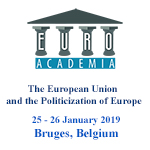Euroacademia Conferences
 Europe Inside-Out: Europe and Europeanness Exposed to Plural Observers (9th Edition) April 24 - 25, 2020
Europe Inside-Out: Europe and Europeanness Exposed to Plural Observers (9th Edition) April 24 - 25, 2020 Identities and Identifications: Politicized Uses of Collective Identities (9th Edition) June 12 - 13, 2020
Identities and Identifications: Politicized Uses of Collective Identities (9th Edition) June 12 - 13, 2020 8th Forum of Critical Studies: Asking Big Questions Again January 24 - 25, 2020
8th Forum of Critical Studies: Asking Big Questions Again January 24 - 25, 2020 Re-Inventing Eastern Europe (7th Edition) December 13 - 14, 2019
Re-Inventing Eastern Europe (7th Edition) December 13 - 14, 2019 The European Union and the Politicization of Europe (8th Edition) October 25 - 26, 2019
The European Union and the Politicization of Europe (8th Edition) October 25 - 26, 2019 Identities and Identifications: Politicized Uses of Collective Identities (8th Edition) June 28 - 29, 2019
Identities and Identifications: Politicized Uses of Collective Identities (8th Edition) June 28 - 29, 2019 The European Union and the Politicization of Europe (7th Edition) January 25 - 26, 2019
The European Union and the Politicization of Europe (7th Edition) January 25 - 26, 2019 7th Forum of Critical Studies: Asking Big Questions Again November 23 - 24, 2018
7th Forum of Critical Studies: Asking Big Questions Again November 23 - 24, 2018 Europe Inside-Out: Europe and Europeanness Exposed to Plural Observers (8th Edition) September 28 - 30, 2018
Europe Inside-Out: Europe and Europeanness Exposed to Plural Observers (8th Edition) September 28 - 30, 2018 Identities and Identifications: Politicized Uses of Collective Identities (7th Edition) June 14 - 15, 2018
Identities and Identifications: Politicized Uses of Collective Identities (7th Edition) June 14 - 15, 2018
Optimism in a Contested Region – Forecasting the Future of the European Union and Armenia
-
-

-
Presentation speakers
- Justin Tomczyk, Armed Conflict Location and Event Database Project (ACLED), Park Ridge, USA
Abstract:
From the ongoing Brexit negotiations to the rise of illiberal populism, the European Union has found itself confronting a variety of existential political threats. Yet despite this turmoil, the values of the European Union remain an aspirational model of political and economic governance for much of the world. As a member of the Russian-led Eurasian Economic Union and participant in the EU’s Eastern Partnership initiative, Armenia represents one of many contested grounds between Brussels and Moscow in the post-Soviet space. Following the recent parliamentary elections and continuing anti-corruption push since the Velvet Revolution, it is possible that Armenia’s post-revolution momentum may meet the newfound enthusiasm for the European project expressed by Chancellor Merkel and President Macron. This paper will present a forecast of Armenia-EU relations for the near future and new potential areas of cooperation. Most importantly, this paper will detail how the various crises facing the European Union (such as Eurozone instability, the spread of populism, and the fraying relations with Turkey) may jeopardize this relationship, and what policies may be enacted to alleviate this threat. This paper will include a brief review of relations between Brussels and Yerevan since 1991 alongside which policy areas that would conflict with Russian interests in the South Caucasus. The main legal basis of this study is the Comprehensive and Enhanced Partnership Agreement (CEPA), a treaty signed in late 2017 that is based on the cancelled 2013 Armenia-EU Association Agreement. This analysis will also draw heavily from Ofelya Sargsyan’s “Pleading For Armenia’s Accession to the European Union”, as well as the exploratory whitepapers regarding PESCO and other proposed EU initiatives, in its policy recommendations.
-
Related Presentations

A European Failure? The European Union’s Policy Towards Transnistria
- Keith Harrington













